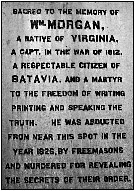 About
13 months later, a badly decomposed body turned up at the point where Oak Orchard
Creek, just east of the Niagara River, flows into Lake Ontario. Lucinda Morgan
identified it as her husband's body; so did Batavia Editor Miller and Thurlow
Weed, editor of an anti-Masonic newspaper, The Rochester Telegraph, and a leader
of the state's anti-Masonic movement. About
13 months later, a badly decomposed body turned up at the point where Oak Orchard
Creek, just east of the Niagara River, flows into Lake Ontario. Lucinda Morgan
identified it as her husband's body; so did Batavia Editor Miller and Thurlow
Weed, editor of an anti-Masonic newspaper, The Rochester Telegraph, and a leader
of the state's anti-Masonic movement.
There was no insurance money or other
financial reason for any of these three to lie, but Masons insisted that they
did. They even insisted that there was no proof Morgan was dead. A Canadian woman,
whose husband had disappeared while fishing at about the same time Morgan did,
asked that the body be exhumed and identified it as that of her missing spouse.
A new tombstone, with the name Timothy Munroe, was erected over the grave.
Whether the body was that of Morgan was immaterial. The nation was enraged. Freemasonry
as a political force in America was as dead as the body resting in the grave.
Anti-Masons rallied to form a third political party, calling themselves the Anti-Masonic
Party, and in 1830 fielded William Wirt as a presidential candidate. Wirt
won few votes, but those he did win came mostly at the expense of Henry Clay,
enabling Andrew Jackson to win a second term. For the first time in American history
a third political party played an important rolethat of spoilerand a precedent
was established. Lucinda Morgan, described by everyone who saw her as beautiful
and innocent-looking, married George Harris, a widower. They moved to Terre Haute,
Ind., where Harris either died or divorced Lucinda. In any case, Lucinda then
became the third wife of Joseph Smith, the founder of the Mormon Church, which
at the time sanctioned polygamy. The three men who snared Morgan from the
Canandaigua jail were convicted of kidnapping, then only a misdemeanor. Each was
sentenced to a few months in jail. No one was ever charged with murder. Morgan's
book was published in December following his disappearance and for a while sold
briskly. The book itself, however, clearly played no significant role in the future
of Freemasonry. Rather, it was the fear of Masons who thought it would play a
role that killed Freemasonry as a political force in America. | 
